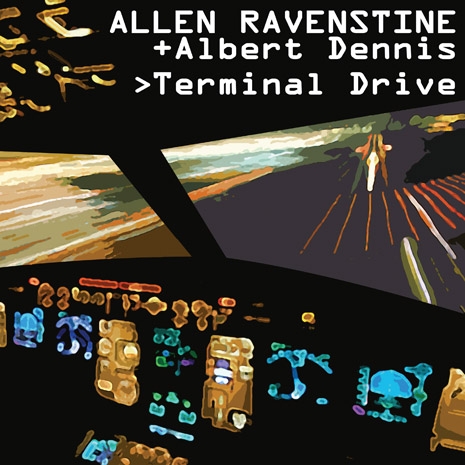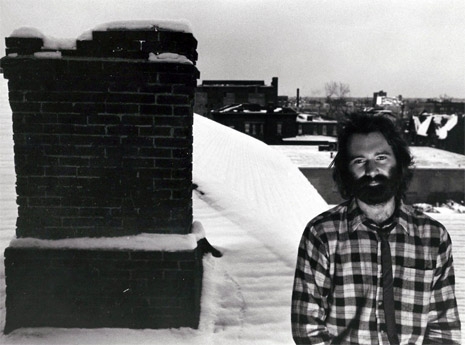
Pere Ubu co-founder Allen Ravenstine’s “Terminal Drive,” a crucial 1975 artifact from the primordial soup of punk, has recently been rediscovered after decades of being presumed lost. It’s a 16-minute electronic composition in two movements, performed by Ravenstine on synth with contributions from bassist Albert Dennis, and it’s THE piece of music that led to Ravenstine being asked to join the fledgling Pere Ubu, whereupon his distinctive amusical synth playing became mighty damn influential.
The only excerpt available from the piece until now has been a snippet titled “Home Life” which appeared, with incorrect session info, on the 1996 5CD boxed set Datapanik in the Year Zero.
Ravenstine left Pere Ubu in the early 1990s to become an airline pilot, and hasn’t really done a whole lot of talking about music since, so Dangerous Minds was extremely pleased to be granted some time to conduct an interview with him.
Dangerous Minds: I want to ask you about your approach to synth playing generally—I know you had some musical training, so I’m curious about how you developed your style. Was it just that those EML 200 synths had no keyboards, or was there a conscious decision at some point to reject playing notes?
Allen Ravenstine: My “musical training” was an attempt at playing trombone when I was in grade school. Much later, I had some boxes that were rewired from fuzztones to make oscillators, and I picked up a thing called a “clipper box,” and I was fooling around with these things just for my own amusement, and someone, I honestly don’t remember who, told me that they had all of these kind of little things in one box and it was called a “synthesizer.” And I became aware of the company EML. They had been commissioned by a department of education in Connecticut to devise a synthesizer that could be used to teach schoolchildren about what was then being called “electron music,” and it was supposed to be something that was basically indestructible, and I got one. It suited what I had already been doing, because it didn’t have a keyboard, it was just knobs, so I already had some sense of what to do with it. I was undisciplined, really, and I didn’t want to muster the discipline to learn how to play a keyboard, so a bunch of knobs was something I knew how to fiddle with to get something satisfying to me without having to go through the rigors of learning fingering. So I guess you could chalk it up to being lazy.
DM: Were there any electronic composers you were listening to at the time or were you more just firing blindly on your own?
Ravenstine: I was firing blindly on my own. I’m not really that aware of things other people have done that are similar to what I’ve done. I’ve always kind of operated from an internal sense of what made sense to me, and with Ubu I was able to hear something and respond. It’s kind of like painting. You mix a color, so you use it, and you get a sense of another color that would go with that color, and then you use that. And so I’m not painting a scene, I hear a sound that’s interesting to me and I put that sound down, and it suggests another sound which suggests another sound which suggests another sound, and then at some point or another I feel like the thing is finished. With Ubu I would listen to what they were playing, and I would listen to what David Thomas was singing about—take “Birdies” for instance, and I would just hear a sound and do something that related to it. So it was about a visual sense in some cases, it was about a literal sense in some cases, and in some cases it was—OK, say “30 Seconds Over Tokyo,” I love the sound of a big rotary engine, like on an airplane, it’s a great sound which you don’t hear anymore, so that sound was suggested to me by the lyric, so I came up with something that was, um, not meant to duplicate that sound, I’m kind of more interested in creating the sense of that sound, not recreating the sound itself.
DM: Huh! So was there any extant music that influenced the creation of “Terminal Drive?”
Ravenstine: If there was, I wouldn’t be able to tell you.
DM: So you created this piece of music that’s now regarded as a lost classic. People know it existed and it’s generally known that it’s what led Pere Ubu to ask you to join them in forming the band. But it’s been gone for so long—who DID hear it, and how did that lead Ubu to you?
Ravenstine: I had been living in a rented house in the country. My housemates all moved out so I ended up having it all to myself. I wasn’t working at the time, and I would just sit with my EML 200 and make tapes. I had a TEAC 3340 recorder, and I figured out how to record three tracks, bump it down to one, then two more, bump it down to one, and so on, whatever that amounts to. And I’d make these recordings, and a guy who was connected with the dance department at Cleveland State University heard about what I was doing, probably because people would come out to the house and jam—[Pere Ubu drummer] Scott Krause was one of them—so people were aware of what I was doing. And one piece led to another piece, and I made this one where I went far enough to get someone else involved, I asked Albert Dennis to contribute, and when it was finished I wanted somebody to hear it. I knew Peter [Laughner, founding Pere Ubu guitarist, RIP 1977] and his wife Charlotte [Pressler, poet/musician], and there was a little gathering, just me and my wife and them and I played this thing and Peter responded to it.
I guess sometime later after that I was told that David was aware of it and wanted to know if I’d be interested in playing. And the sense I had at the time was this band Pere Ubu was an experiment. I don’t know, if David was standing here maybe he’d be shaking his head saying “you’re out of your mind,” but my sense of the idea was that if you put a bunch of people together that had a similar way of looking at the world, even if they weren’t necessarily musicians, you could give them instruments and they would come together and make something of value. So it was less about being proficient at an instrument, and more about who you were as a person. So I agreed to do it.
The first thing we were going to record was “30 Seconds Over Tokyo.” I knew Scott and I knew Peter. David, I didn’t really know.
DM: So where’s “Terminal Drive” actually been all this time? I know that one snippet turned up on Datapanik, so what survived, where did it all go? And how did it come back?
Ravenstine: There’s a fellow Steve, who has a record label in San Francisco called Superior Viaduct. I can’t tell you how he got my number but he got in contact with me somehow, and told me that he did specialty vinyl and that he would be interested in putting out a vinyl edition of “Terminal Drive.” I told him that was very flattering but I didn’t have it. He voiced some surprise, but—OK, you know, the thing is, at the time, who knew these things would have any lasting value? I don’t know about David, he’s a chess player so maybe he had a plan all along, but I don’t think most of us in Ubu had any idea this little thing we started was going to end up with a record contract. So the point is I didn’t really have any sense that this recording would have any lasting value so I didn’t make any effort to keep it. So I said I’d look for it, and that led me to go through a trunk I had in the basement that had some tapes in it, and I went through all this stuff to listen to, and none of them were it. I was pretty sure that was true anyway, I didn’t have a cassette, I didn’t have anything, so I said I’m sorry I can’t help you, but if I ever run across it, you’ll be the first to know.
And then, not long after that, Frank Mauceri [Smog Veil Records honcho] started the same conversation with me. And I told him the same thing, I said I didn’t have it. And then he at some point sent me some snippets via Soundcloud, not even thirty seconds long, they were just little ten second bits. And he asked me, were these bits from “Terminal Drive?” And it was very odd, it was like being at the airport when they make that announcement, if you lost your wallet, return to the gate and be prepared to identify it. I thought “why am I being asked this, why don’t you just send me the whole thing and I’ll tell you if that’s it or not?” But I played along and I said look, some of them sound like it’s possible that they’re from that piece of music, there’s a couple I think are, there’s one that I’m absolutely sure is… Eventually, he got a bunch of it, and then I was able to identify it, and we started up this process, and it eventually Frank ended up with it and he wanted me to license it to him. But I felt terrible, because of the previous conversation with Superior Viaduct. So I spoke with Steve and I explained that even though I gave him first shot at it, I didn’t actually have it, and Frank went to effort and expense to track it down, so I really had to let him release it.
I still don’t have it!
DM: They’ll probably give you a copy of the record though, right?
Ravenstine: [laughs] I told Frank that when this is all over I should be the one to end up with that copy of the tape! It turned out that he got it from a guy that I knew way back in the day who wasn’t even involved in music, and he can’t even remember how he ended up with it!

“Terminal Drive” will be released on CD, vinyl, and digital by Smog Veil Records at the end of summer, but they’re taking pre-orders now. Since it’s just one track, I wasn’t able to get the whole thing for you to hear, but this 2 1/2 minute edit is available to preview.
Many thanks to Nick Blakey for contributing extremely helpful background information for this post.
Previously on Dangerous Minds:
‘Pere Ubu is like a cup!’ insists David Thomas
‘Irene:’ New Pere Ubu video is eerie and gorgeous
Before Pere Ubu, there was the Robert Bensick Band—a Dangerous Minds premiere